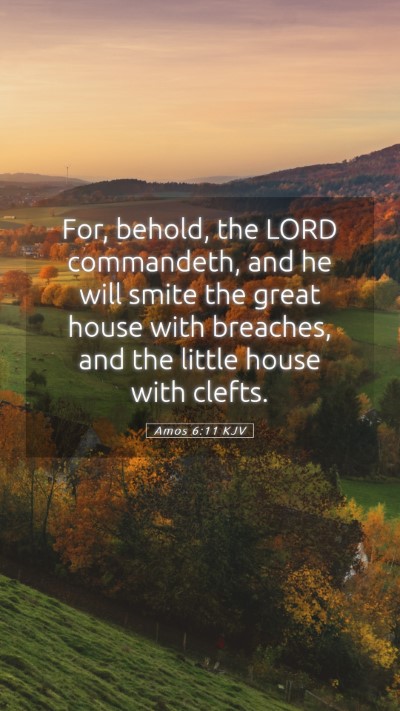Old Testament
Genesis Exodus Leviticus Numbers Deuteronomy Joshua Judges Ruth 1 Samuel 2 Samuel 1 Kings 2 Kings 1 Chronicles 2 Chronicles Ezra Nehemiah Esther Job Psalms Proverbs Ecclesiastes Song of Solomon Isaiah Jeremiah Lamentations Ezekiel Daniel Hosea Joel Amos Obadiah Jonah Micah Nahum Habakkuk Zephaniah Haggai Zechariah MalachiAmos 6:11 Meaning
What is the meaning of Amos 6:11?
For, behold, the LORD commandeth, and he will smite the great house with breaches, and the little house with clefts.
Amos 6:11 Bible Verse Meaning
Understanding Amos 6:11
The verse Amos 6:11 states: "For, behold, the Lord commandeth, and he will smite the great house with breaches, and the little house with clefts." This verse carries significant meaning and is subject to various interpretations within biblical scholarship. Below is a summarized explanation that combines insights from public domain commentaries by Matthew Henry, Albert Barnes, and Adam Clarke.
Bible Verse Interpretation
In Amos 6:11, the 'great house' and the 'little house' represent different classes within society; the great house symbolizes the powerful and wealthy, while the little house represents the oppressed and poorer classes. The command of the Lord to smite both types of houses reflects a divine judgment that does not discriminate based on status, emphasizing God's sovereignty and impartiality in executing justice.
Commentary Insights
- Matthew Henry: Henry emphasizes that God's judgment will come upon all houses, indicating that both the rich and the poor cannot escape divine accountability. He likens the breaches and clefts to the impending ruin and division that God brings as a consequence of sin and neglect of justice.
- Albert Barnes: Barnes elaborates on the symbolism of the 'great house' being a representation of the temple or places of worship that had become corrupted. He also notes that the 'little house' indicates that the judgment extends to all people, regardless of their socio-economic position, urging individuals to reflect on their moral standing.
- Adam Clarke: Clarke discusses the literal sense of 'breaches' and 'clefts', arguing that the Lord’s judgment will result in ruin, not just physical destruction, but spiritual consequences as well. He stresses that this is a call to acknowledge sin and repentance among all strata of society.
Application of the Verse
Amos 6:11 serves as a sobering reminder that divine judgment is impartial and comes in response to societal injustices. For modern readers, the verse calls for self-examination regarding one's actions and the impact they have on others. It encourages Christians to pursue justice and righteousness, understanding that all are held accountable before God.
Historical Context
The book of Amos was written during a time of prosperity in Israel, but it was marked by great moral decline and hypocrisy. Amos was called by God to warn the people about impending judgment due to their complacency and oppression of the marginalized.
Cross References
- Isaiah 5:8-10 - A warning against greed and injustice.
- James 2:1-7 - The dangers of favoritism and inequality.
- Matthew 23:37 - Jesus lamenting over Jerusalem, reflecting the theme of judgment.
Conclusion
In summary, Amos 6:11 provides profound Bible verse meanings and interpretations that are relevant for contemporary believers. It challenges individuals to reflect on their actions and societal roles, ensuring that they align with biblical principles of justice and equity. This verse, alongside its robust commentary, enriches our understanding of Scripture and serves as a vital part of our Bible study insights.
Further Exploration
For those engaged in Bible study groups or online Bible study, this passage provides ample discussion points regarding the implications of divine justice and calls for believers to explore the meaning of Bible verses within their historical and cultural contexts. Utilizing various Bible study tools and resources can further enhance the study of this significant scripture.


